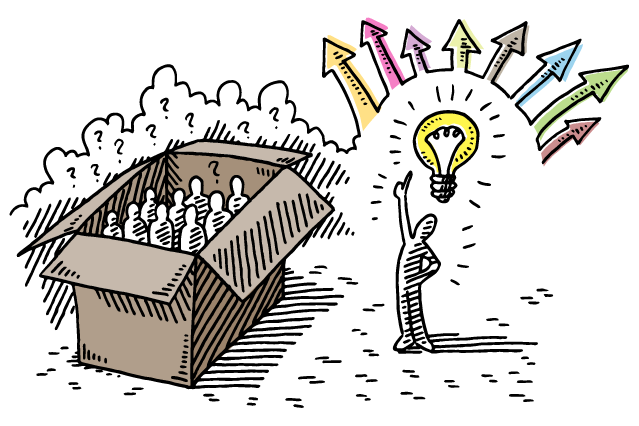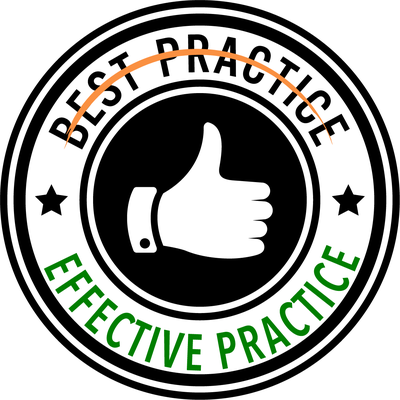Posted: December 14, 2022
For a long time, child-development experts trumpeted the phrase "best practice" or "best practices." Things are changing. In the fourth edition of Developmentally Appropriate Practice in Early Childhood Programs, the National Association for the Education of Young Children (NAEYC) authors decided to purposefully no longer use the phrase "best practice." Instead, they often choose the wording "effective practice."

Thinking out of the box and beyond "best practices".
"Best has often been used in the United States to reflect the dominant culture's assumptions. Educators who rely on the notion of a single 'best' practice often make assumptions based on their own experiences which may not have involved extensive experiences with a variety of populations…developmentally appropriate practices must be determined with an understanding of specific contexts in mind" (NAEYC, 2022, p.xx). "There is greater variation among the 'universals' of development than previously recognized" (NAEYC, 2022, p. xix).
This isn't the only reason that a person's understanding of what's best might evolve. Educators also understand that knowledge expands and changes over time. What was thought to be "best" twenty years ago may need to be revised for current routines because researchers now understand the workings of the brain or body or environment differently. This was the case in recent years with some feeding recommendations. The American Academy of Pediatrics now recommends continued breast/chest feeding "along with complementary foods…as long as mutually desired by the mother and child for 2 years or beyond" (Meek & Noble, 2022, para. 1). That was not always the case.
And the USDA Dietary Guidelines for Americans 2020-2025 now recommends, rather than delaying consumption of peanut products until after a child turns 2, that caregivers introduce this at a relatively early time around 6 months of age (USDA & HHS, 2020). Similar refinements in the past have occurred for recommendations for clothing designs, sleep positions, curriculum approaches, and more. It is crucial for educators to have intellectual humility and a flexible, growth-oriented mindset, ready to consider a new idea, to test it, to observe, to ponder. Chad Littlefield, co-founder of We and Me and expert on conversation and connection, often describes things as a "best practice" so far. He learned this phrasing from author Erik Tyler whose books The Best Advice So Far and Tried and (still) True hint at the fact that understandings change, and people can learn and grow.
So, what does this mean for early childhood education (ECE) and out-of-school time (OST) professionals? For each person, the list may look a little different. Here are some possibilities:

- It's important to fact-check. Look things up. Ask questions. Practice saying, "I know people used to…is that still recommended?"
- When faced with a new practice, educators might say "This is different from what I have been doing. Can you help me understand why this is important?"
- When getting to know a new family, say "It's possible that we may approach things differently. I really want to get to know you and how your family works. I hope you're willing to help me and answer questions when I have them. I respect your ideas."
- Read. Read ideas from other educators, but also from botanists, politicians, philosophers, engineers, children, and senior citizens. Be curious about how subjects are tackled in other parts of the globe.
- Observe. Your own eyes and mind are great tools. Part of why understanding is refined is because people ask questions, notice things, and take the initiative to investigate. Each educator can be a citizen scientist in their own space!
- Talk and think with others, within and beyond the ECE/OST family.
Those ideas and the ones on your own list, collectively, may become what's best--rather, what's effective--as educators continue to provide essential care and engaging experiences for children and youth.
References
Meek, J. Y., & Noble, L. (2022). Policy Statement: Breastfeeding and the Use of Human Milk. Pediatrics, 150(1).
NAEYC (National Association for the Education of Young Children). (2022). Developmentally Appropriate Practice in Early Childhood Programs Serving Children from Birth Through Age 8. 4th ed. Washington, DC: NAEYC.
U.S. Department of Agriculture & U.S. Department of Health and Human Services. (2020). Dietary Guidelines for Americans, 2020-2025. 9th Edition. Available at DietaryGuidelines.gov.

